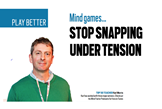Mind Games: Stop snapping under tension
Published: Last updated:
There is only one place to improve your ability to deal with tension and that’s on the course.
When you work on them mental side of your game, you are also working on the physical. There are all kinds of ways your brain affects how your body works, and for golfers the most obvious and serious example is tension.
The desire to eliminate unwanted muscle tightness is one of the very few areas of consensus in golf coaching… but the root of this most physical of issues is your grey matter.
If you have ever had that feeling that you are better than you are, or wondered why your range swing rarely shows up on the course, tension is most likely your answer. Dealing with tension won’t improve your technique… but it will help you ensure you get the very best out of what you have.
Essentially, tension is the result of doubt. When you have no doubt – for example, finding your mouth with a fork – you have no tension. On the range we rarely experience doubt because there is very little riding on each shot, and there is always another ball to hit. Consequently, we tend to feel relaxed as we practise, and perform much better… and indeed closer to the potential our technique allows.
On the course, however, the conditions for doubt are ripe. This is, after all, where your game will be tested and exposed, where there is consequence to your miscues. Your mind starts to create scenarios of what may happen, and scrambles for solutions. The worry and doubt triggers that ancient, maladaptive part of your brain that perceives threat and prepares for it. The result is a tightening of muscles that might be good for fighting or eeing, but are ruinous to the affluent and controlled motion demanded by the golf swing.
The perverse upshot of this is that we play badly, blame it on a technique that “breaks down” and head back to the safety of the range to work on it. Note it well – there is only one place to improve your ability to deal with tension and that’s where you feel it… on the course.
Yes, doubt is at the heart of tension. But at the heart of doubt is the fear you might a bad shot. If you are going to break through this destructive cycle, you have to first embrace the idea that failing is a part of being successful.
Step 1
If you can accept the fact that you can and will hit some poor shots, you have made a vital first step. After all, when you are not scared of hitting the bad shots, you create the opportunity to hit the good ones. On your next round, make a commitment to prepare mentally to accept bad shots.
Step 2
The second step to dealing with tension lies in awareness. Tension is something we feel individually – some in the shoulders and neck, some in the stomach, others in the hands and forearms. But it’s only when you become aware of your own tension pattern that you can start to take measures to mediate it.
So become your own tension detective, on the lookout for those rst signs of tightness. And when you feel it, play about with it; for example if you notice your hands tightening on the club just before you take it away, grip tighter still before relaxing your hands.
If you struggle with your awareness, here are two great ways to improve. Firstly, give your tension a colour; creating a sort of tension heat map of your body can help you identify which areas are tight and which are relaxed.
Secondly, try an old Timothy Gallwey tactic of humming through your swing. Ideally you will create a low, even pitch; when tension shows up, the pitch will rise.
Step 3
Your third step to beating tension is to focus on your breathing. Breathing affects heart rate; try a series of short, quick breaths through your mouth and you will feel it start to pump, a sensation that promotes a nervous state and increases the potential for tension in your limbs.
Instead, when you feel tension rising inside you, commit to inhaling and exhaling slowly through the nose before stepping into the shot. It will help calm your heart rate, and relax your muscles.
It would be a stretch to say we can eliminate tension – and indeed there is some evidence to suggest that performance suffers when we are too relaxed. But these measures will help you get yours under control, and put you in the alert and ready state that will help you get the best out of yourself.

